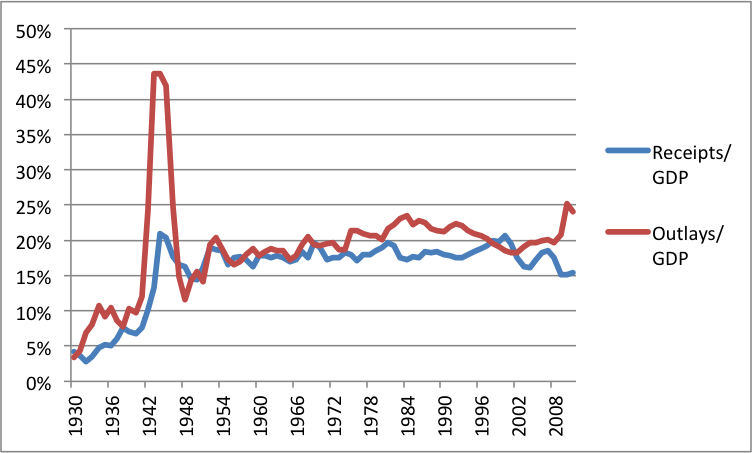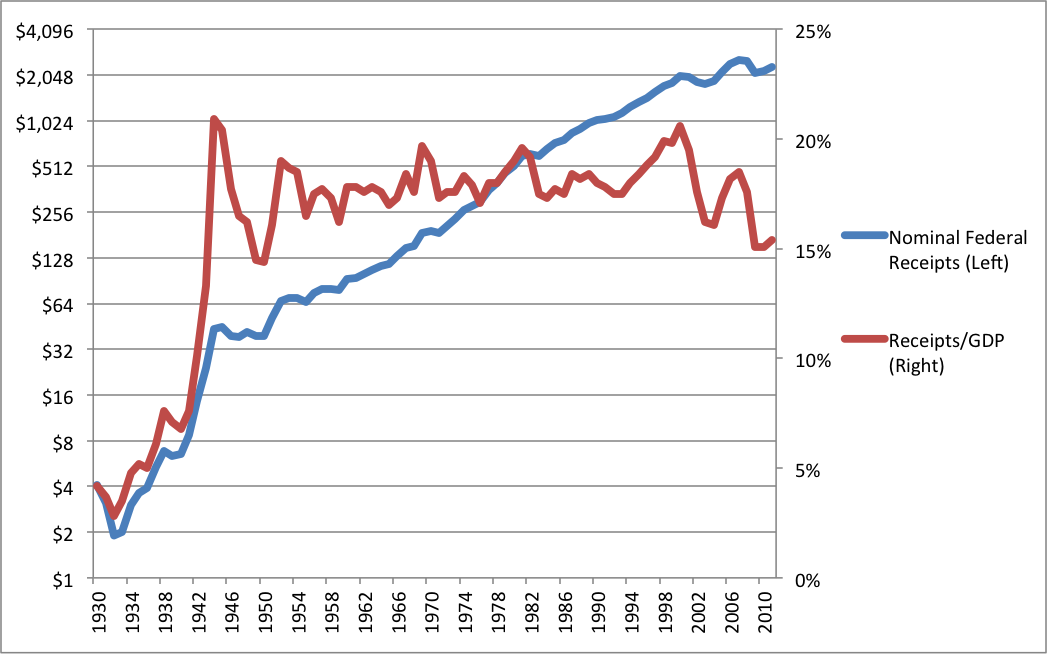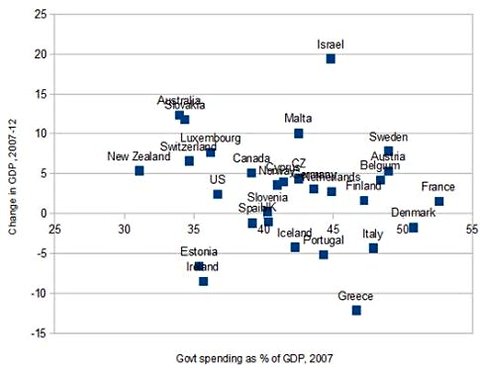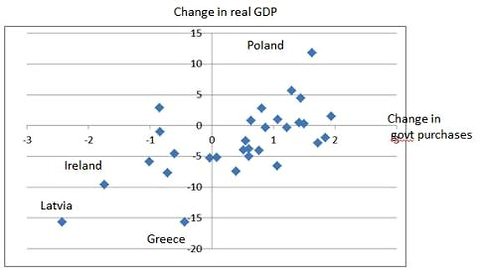Potpourri
Some of these have been sitting on my browser for so long, they started paying rent…
FORGOT IN INITIAL POST: This YouTube video of Superman vs. the Hulk is hilarious. I’m not talking about the video itself, which you don’t even need to watch. I’m talking about the comments. I scrolled through five pages of them. Yes, I was very bored, but they are also very funny. I love seeing people argue with passion, citing evidence and accusing others of specific fallacies…in reference to Superman vs. the Hulk. I imagine it’s how God views our economics debates.
* I have a new, recurring column (every other week) at The American Conservative. My inaugural one concerned the claim that the US has to wage wars to support its addiction to oil.
* David R. Henderson has a nice Memorial Day post.
* Another post from David, on how to act when you’re a captive. I thought the commenters made a lot of good points. The internet at its finest! (It’s a low bar.)
* I saw this blog post from “Lord Keynes” calling Hayek a bigot in the title, and I rolled my eyes. But…turns out Hayek was a bigot (unless the quote is fake).
* This American Presidency Project is really neat, and has a lot of useful data for those of you interested in the seat of our Imperial Government. For example, it’s where I got all the federal spending and receipts data. (They go back farther than other sources I can easily find.)
* Alex Tabarrok has an interesting post speculating that the SEC might be responsible for the social waste due to high frequency trading.
* Joe Salerno gives me props, then takes Steve Horwitz to the woodshed.
* Tom Woods throws down with the U.S. military.
* I think I need to start a sinking fund.
* Here’s a Telegraph hit piece on Krugman, and here’s a NY Post one. For the latter, I emailed this to the author:
Hi Mr. Smith,
I really enjoyed your Krugman piece until the very end. I am almost positive that Krugman is impugning the “Very Serious People” or maybe just Republicans, in that quote about policies hurting the workers and the poor. But your piece makes it sound like that is supposed to be a strike against Krugman.
Bob Murphy
P.S. I would look it up myself but…there isn’t a link to his quote. 🙂
Federal Government Outlays and Receipts as % of Nominal GDP
Here you go kids:
So as I exclaimed in an earlier post, the receipts line shocked me. I have been working a lot with federal spending and knew about the WW2 bulge, but you can see how it crashed right after the war. (This gave rise to all the songs we still sing to this day, about the horrible 1946 depression…[crickets].)
I had just assumed that federal receipts followed a similar trend, but as you can see, they basically jacked up taxation big time for the war…and left it there.
Two things:
(1) Yes yes, I know there are problems with calculating nominal GDP etc. If you want to say that we shouldn’t be counting $1,000 in federal spending on tanks the same as $1,000 in private spending on cars, then the lines above would be even more pronounced during WW2.
(2) No no, I have no idea why WordPress stretches out my graphics. I have tried adjusted the “height” variable in the automatic code it generates when I upload an image, to no avail. The Internet works in mysterious ways, and I do not question it.
Bob Higgs Was an Optimist: No “Ratchet Effect” When It Comes to Federal Tax Receipts
[UPDATE in text.]
I am working on a project for the Macdonald-Laurier Institute, summarizing the U.S. government’s sorry fiscal situation. I worked up a chart showing the history of federal spending from FY 1930-2011, and it was just what I expected: big surge up through World War II, then a major pullback, and finally a gentle secular increase until a tapering off in the Clinton years, followed by an explosion under Bush then Obama.
I then went in the text to talk about federal tax receipts, and said (without having constructed the chart) something like, “As Figure 2 shows, we see a similar pattern–though not as high, because of budget deficits–for federal tax receipts.” Then I went to Excel and whipped up the chart, and was shocked by what I saw.
I don’t think I have ever seen the below chart, have many of you? Most data sets start in 1947 or later. Look at this thing:
(Note that the blue line [left axis] is on a semi-logarithmic scale, so that its slope represents the rate of increase in nominal receipts.)
I actually had to go double-check the numbers. This illustrates that the federal government incredibly jacked up how much it taxed out of the economy going into World War II…and never pulled back. [UPDATE: Actually that’s not right, there was the ratchet effect. But my point is, this chart looks nothing at all like what happened with federal spending as a % of GDP. Relative to that, there was essentially no pullback in taxation as a share of the economy, after World War II. We hit a permanently higher level.) Indeed, in FY 1944, at the height of the war, the government collected a record 20.9% of GDP in receipts. In FY 2000, the feds collected 20.6% of GDP in receipts.
Last thing: I am referring in the post title to Bob Higgs’ famous “ratchet effect” of crises. I am quite sure Higgs knows about the above chart, so I’m just making a joke of course. If you want to see a compilation of Higgs talking about wartime statistics, see this video (compiled by Niels V.).
Quick Thoughts on Christians and Marriage
Over the past few weeks I have seen a lot of secular libertarian commentary on the issue of gay marriage. I don’t think there is an adequate understanding of the traditional Christian view on this issue, so in this quick post I just want to try to frame the issue a little more correctly. This is obviously a really touchy subject, especially since I know plenty of openly gay people and it’s awkward if I write something and then they think, “Oh, Bob must despise me.” So, I hope that’s not how this post comes across, but anyway I really do think people aren’t understand what a truly “Christian” view is.
First of all, it is absolutely ridiculous if a Christian carries around signs saying, “God hates f***!” etc. Even if you think homosexuality is a sin, if you’re a Christian then you think we are all sinners, and so you had better wear a shirt that says, “God hates all of us!” to be consistent. But oops, you wouldn’t do that, because you also think God loves all of us.
Second, it’s not quite right when secular critics say, “Why would God punish someone for the way he was born?” Or at least, that’s not the discriminatory zinger that the critics think. By my understanding, the most one could say is that the Bible condemns sodomy, or if you will, acting upon one’s homosexuality. It’s not one’s orientation per se that it the issue. And if you say, “Well that’s still absurd, why is the Christian God telling me to not act on my natural urges?” well OK, but He also tells heterosexuals not to sleep with other men’s wives, not to get drunk, not to rob a bank even though getting money is fun, etc. Yes, go ahead in the comments and draw a distinction and say that heterosexuals get an approved outlet for some of their urges, whereas the homosexuals don’t, but my point is that the critique (“I’m being punished for the way God made me”) isn’t really limited to the issue of gay marriage, it has more to do with free will and God’s sovereignty altogether.
Third, I personally don’t even get into the issue of, “Is homosexuality a sin, according to the Christian Bible?” It would be hard to deduce that merely from the prohibitions in the Old Testament, since there are plenty of things there that Christians no longer endorse. There are writings from Paul that would carry more weight (to a modern evangelical Christian), but then again Paul says a lot of stuff in his writings that modern Christians don’t necessarily take at face value.
Since Jesus said–in reference to a heterosexual caught violating the Mosaic code–“let him who is without sin cast the first stone,” I don’t really even get into this issue. I have done all kinds of stuff that I believe is a sin, like going to websites that I shouldn’t. So there’s no way I’m going to get worked up about how other people are living their lives, because you’re going to see nothing but rampant sinners all over the place if that’s how you want to approach the world. (In other words, if some evangelical is pointing at a gay couple and telling me, “Hey Bob, there go two rotten miserable sinners, don’t you agree!” I will say, “Sure, and the same is true of any heterosexual couple, without the work of Jesus on the cross.”)
Finally: The thing about the marriage issue from a Biblical Christian perspective, it seems to me, isn’t that we’re endorsing “sin” or not. Rather, the reason this is such a big deal for Christians is that people are using the government to try to culturally redefine a crucial institution. Look, let me be clear; I am NOT even saying here that I think the government ought to go one way or the other one this issue; there really isn’t a good answer, once government starts wading into this matters. (It’s like asking, “Should kids be allowed to pray at lunch in a government-run school, or should teachers be able to say, “Merry Christmas” in December?” There’s no principled, non-slippery slope answer to that.)
What I am saying is that it is very understandable why Bible-believing Christians would be really upset if the government sanctions homosexual unions and calls it “marriage.” The correct Christian objection (it seems to me) isn’t, “Ugh! I hate those freaks so much! No way! Hate hate hate!” Rather, the correct Christian objection–if the Christian is going to object–is to say, “I’m sorry, that’s just not what marriage is. God established marriage to be a union between one man and one woman. It’s why Jesus didn’t endorse divorce, and it’s why homosexual unions just can’t count as marriage. Yes, by all means let’s change the tax code so we’re not penalizing people unfairly, but I cannot go so far as to say, ‘Yes this is marriage just like these other relationships’ because I simply don’t believe that’s true. I’m sorry if that offends somebody but given my views of how the universe was created and Who created marriage in the first place, that’s what it is and a majority of voters can’t change that simple truth.”
I am not going to bother making an explicit analogy, because the last time I did that people got offended. So, in your mind, come up with something ridiculous that the government would then want to call “marriage,” and see if you can understand why people would object to that. Not because they want to stymie the person involved, but because they would say, “Huh? That doesn’t make any sense. That’s just not what a marriage is.”
I do agree that the evangelical Christians have done a terrible job getting their message out. In particular, I really wish they would tell Rush Limbaugh and other multiply-divorced people to keep their mouths shut on the topic, in a gentle way of course.
Coalition to Reduce Spending–Does It Include Me?
I know a guy involved with this project and he asked me to endorse it. What do y’all think? If you wish, you can distinguish between the very idea of someone with my gravitas giving an endorsement to this kind of dirty political thing, versus this particular dirty political thing.
More Charting Fun With Krugman–Job Creation Edition
What I mean by the title, is that I have a menial task for some plucky Free Advice fan. In this post from May 3, Krugman was arguing that there was no correlation between the size of government pre-crisis and how it did during/after the crisis. He posted this chart:
In reference to the above, he wrote, “So what is the correlation between the size of government and recent economic performance? None at all, as far as I can see.”
Now when I eyeball that chart, it seems that there is definitely a negative correlation. That doesn’t mean causation, of course, but my point is that Krugman isn’t able to “see” anything there, when I think I can see a pattern.
What struck me as funny about this is that very often Krugman will put up scatter plots that bolster his case (in his mind), even though there are a lot of outliers in those ones too. Because I don’t subscribe to the NYT, and also because I was busy, I didn’t bother going back and looking them up, but I remember Daniel Kuehn called Krugman out on one of them within the last few months.
Anyway, on May 21 Krugman put up a scatter plot that he thought showed how obvious the case for stimulus was:
So here are my requests:
(1) Can someone grab the data Krugman used to generate the above charts, and then plot the OLS regression line and give us the stats (like the R^2 value I guess)? I’ll PayPal you $15 if you do it right and I agree you accurately reproduced Krugman’s charts. (It will have to be the first person who emails it to me. If you do the work and someone beats you to the punch, that’s not my fault. So maybe you should coordinate in the comments.)
(2) Now I confess, I think the second chart looks like a way better correlation too. I’m just saying, Krugman is denying that the first one has any pattern, when I think I see one. But, I wonder if Krugman has ever posted another scatter plot in the past, where he also drew the line in himself to help the readers “see” it, that has a worse fit than the first plot above. If you can show me that, I’ll PayPal you $40. (If it’s really close, like you find him touting a chart that has only a slightly better fit than the one he says has no pattern at all, then I’ll probably give it to you.)
I remain final arbiter in all disputes over payment. I am the decider. But please talk to each other; this happened before when I wanted students at a school to dig up Paul Samuelson’s referee reports on my articles, and two guys did it simultaneously and I had to tell one of them I already paid somebody else. So be careful out there, kids.
Laffer vs. Krugman
My former employer Arthur Laffer will be on Bill Maher’s show with my future employee* Paul Krugman on Friday, May 25. I have sent Dr. Laffer material to prepare him for possible Krugman attacks. I have sent no such material to Dr. Krugman.
I don’t even have a TV, so if anyone wants to risk years of prison by posting this on YouTube, that would be cool…
* Think: the end of Back to the Future.
Gambling Economists: Behind the Scenes
OK Bryan Caplan and I are running around in circles, so I’m asking for your help. Bryan said I could reproduce our email exchange:
==============
BOB WROTE:
https://consultingbyrpm.com/blog/2012/05/betting-bryan-on-ron-paul-vs.-ross-perot.html
BRYAN WROTE:
Sorry to aggravate you, Bob. Given that Perot ran 20 years ago, I’d think a decent metric of “lasting influence” would have to take that lag into account. And I don’t think that mere fandom counts as influence. Here’s roughly what I’d propose:
Right now there are roughly zero members of Congress that openly call themselves followers of Perot. Maybe a few, but none that I’ve ever heard of. I’ll take your 4:1 odds that in twenty years there are no more than 4 members of Congress (1% of the body) that openly call themselves followers of Paul.
BOB WROTE:
Well there are two problems with that for me. I’m not saying it’s dead in the water, just expressing my concerns:
(1) Where is the 1% coming from? Right now I think the actual answer is that precisely 0 people say they are “followers of Perot.” So if Ron Paul had just 1 person saying s/he were a follower of RP in 20 years, then wouldn’t I win? Why are you insisting Paul have 4 followers, when Perot has 0?
(2) This is a hard thing to measure objectively. E.g. suppose we were trying to assess whether Paul Ryan is a “follower of Rand.” We could both make a decent case, since there are obvious things saying he is (like handing out her book) but then recently I think he threw her under the bus when trying to appeal to Christians. Politicians aren’t going to want to sound like dupes so nobody is going to actually say, “I am a follower of Ron Paul.” What if someone says, “I think Ron Paul did the country a great service by raising the issue of Fed secrecy.” Do I win or you on that politician?
BRYAN WROTE:
> Well there are two problems with that for me. I’m not saying it’s
> dead in
> the water, just expressing my concerns:
>
> (1) Where is the 1% coming from? Right now I think the actual
> answer is
> that precisely 0 people say they are “followers of Perot.” So if
> Ron Paul
> had just 1 person saying s/he were a follower of RP in 20 years, then
> wouldn’t I win? Why are you insisting Paul have 4 followers, when
> Perot has
> 0?
Fair question. I’m just being lazy about doing a detailed search for Perot-influenced politicians. And I figure that 1% is approximately equal to 0% for practical purposes.
>
> (2) This is a hard thing to measure objectively. E.g. suppose we were
> trying to assess whether Paul Ryan is a “follower of Rand.” We
> could both
> make a decent case, since there are obvious things saying he is (like
> handing out her book) but then recently I think he threw her under
> the bus
> when trying to appeal to Christians. Politicians aren’t going to
> want to
> sound like dupes so nobody is going to actually say, “I am a
> follower of
> Ron Paul.” What if someone says, “I think Ron Paul did the country
> a great
> service by raising the issue of Fed secrecy.” Do I win or you on that
> politician?
Fair question. I’m happy to interpret influence broadly (I’d count Ryan as Rand-influenced, for example). But that’s still vague. The simplest route is just to agree on an arbitrator likely to be alive in 20 years. Brian Doherty is the obvious choice.
BOB WROTE:
I’m really not trying to be difficult, but if we make it something that is a judgment call, the wager isn’t definitive. I mean, suppose Doherty agrees that you won. That won’t make a lick of difference to Ron Paul fans; they will say Doherty is an idiot.
So I really think you and I should agree on some objective thing, and it’s up to Ron Paul’s fans to tell me in the beginning that I accepted a dumb bet if they think he will lose it. But if they all think it’s shooting fish in a barrel, and then Perot wins, that would be something.
The other thing is, I would hate to tell Brian Doherty, “By the way, in 20 years Bryan and I are going to ask you to review the biographies of every member of Congress and tell us which ones were influenced by Ron Paul.”
BRYAN WROTE:
How about something like “Within 20 (or even 10) years, the NYT, WSJ, or Washington Post will run two news articles explicitly about ‘elected politicians influenced by Ron Paul'”? It’s got to be plural – someone newsworthy in addition to Rand Paul. If this seems like a high bar, note the stories about Paul in the NYT over the last two years.
BOB WROTE:
Well again though, I’m just thinking that if I lose, the true fans will say, “It’s a conspiracy from the mainstream media.”
Can I reproduce our emails on my blog, and see if anybody comes up with a suggestion we both like?











Recent Comments